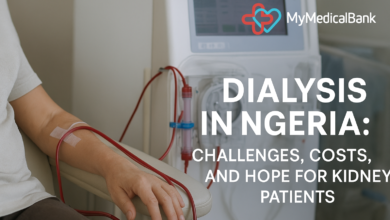How Telemedicine Helps in Suicide Prevention

Suicide is a significant global health concern that has devastating effects on individuals, families, and communities. In Nigeria, the issue of suicide is increasingly becoming a public health challenge, with reports showing that mental health issues are on the rise. Despite the growing awareness of mental health, suicide rates remain high due to various factors such as stigma, limited access to mental health services, and insufficient infrastructure.
However, telemedicine has emerged as a potential solution to address these challenges. Telemedicine allows individuals to access medical care remotely, offering a lifeline to those in need of mental health support.
This article discusses how telemedicine helps in suicide prevention in the Nigerian context and how platforms like MyMedicalBank are playing a crucial role in providing accessible mental health services.
The Suicide Problem in Nigeria
Suicide is a critical issue in Nigeria, with numerous factors contributing to the rising incidence of suicide cases. Mental health conditions, such as depression, anxiety, and post-traumatic stress disorder (PTSD), are common triggers for suicidal thoughts and actions. These conditions often remain untreated due to the stigma surrounding mental health and the shortage of mental health professionals.
According to estimates, about 30% of the Nigerian population suffers from mental disorders, and approximately 1 in 10 people are at risk of developing a mental health condition at some point in their life. However, only a small percentage of individuals have access to mental health care services, especially in rural areas.
In a country like Nigeria, where mental health services are scarce and access to healthcare is uneven, telemedicine offers a promising solution. Telemedicine is the use of digital communication tools, such as video conferencing, phone consultations, and online platforms, to provide healthcare services remotely.
Barriers to Mental Health Care in Nigeria
Several factors hinder access to mental health care in Nigeria. The stigma associated with mental illness is one of the most significant challenges. Many Nigerians perceive mental illness as a taboo subject, leading to fear and reluctance to seek help. People with mental health issues may be ostracized by their communities or even their families, which discourages them from reaching out for support.
Another barrier is the limited availability of mental health professionals, especially in rural areas. According to the Nigerian Psychiatric Association, the country has fewer than 200 trained psychiatrists to cater to a population of over 200 million people. This means that most Nigerians, particularly those in rural areas, cannot access adequate mental health care.
For those living in urban centers, long waiting times and the high cost of care often make mental health services inaccessible. Telemedicine can address these gaps by providing remote access to mental health professionals, allowing individuals to receive timely interventions and support, regardless of their location.
How Telemedicine Helps in Suicide Prevention
1. Access to Timely Mental Health Support
One of the primary benefits of telemedicine is that it allows individuals to access mental health services without leaving their homes. This is especially important in a country like Nigeria, where there is a shortage of mental health professionals and many people live in underserved areas. With telemedicine, individuals can schedule consultations with licensed therapists, counselors, or psychiatrists online.
Telemedicine also facilitates regular follow-up care, which is critical for people dealing with depression or suicidal thoughts. Patients can have ongoing consultations with their healthcare providers, ensuring that their condition is closely monitored and that appropriate adjustments are made to their treatment plans.
2. Confidentiality and Privacy
In Nigeria, the stigma associated with mental illness can prevent people from seeking help, especially in smaller communities or rural areas. Many individuals fear that seeking mental health support will lead to social exclusion or damage their reputation. Telemedicine offers a level of confidentiality that traditional face-to-face consultations may not provide.
Patients can access mental health care from the comfort of their homes, ensuring their privacy and reducing the risk of being stigmatized. This sense of anonymity can encourage more individuals to seek help before their mental health issues escalate to suicidal thoughts.
3. Reaching Rural and Remote Areas
A significant portion of Nigeria’s population lives in rural areas where access to healthcare is limited. According to the National Bureau of Statistics, about 50% of Nigeria’s population resides in rural areas, many of which lack proper healthcare infrastructure. This lack of access to healthcare means that individuals living in these areas often go without the necessary mental health interventions.
Telemedicine bridges this gap by enabling people in remote areas to connect with healthcare professionals without the need to travel long distances. By providing telehealth services in these underserved regions, telemedicine ensures that individuals at risk of suicide have access to the mental health support they need.
4. Reducing the Financial Barrier to Mental Health Care
The high cost of healthcare is another barrier to accessing mental health services in Nigeria. Many Nigerians cannot afford to pay for in-person consultations, which are often expensive and may require transportation costs. Telemedicine offers an affordable alternative by reducing the need for in-person visits.
Online consultations and therapy sessions are typically less expensive than traditional face-to-face visits, making mental health care more accessible to a larger population. This is particularly important for individuals from lower-income backgrounds who may otherwise forgo seeking help due to financial constraints.
5. Crisis Intervention and Emergency Support
Telemedicine platforms can also provide crisis intervention services, which are essential for individuals experiencing acute suicidal thoughts or behaviors. Many telemedicine platforms offer emergency hotlines or 24/7 mental health support services, allowing individuals in distress to get immediate assistance. These services provide a safety net for people who may be at risk of self-harm, offering them a way to connect with a professional when they need help the most.
6. Promoting Mental Health Education and Awareness
Telemedicine platforms also play a vital role in educating the public about mental health and suicide prevention. Many platforms offer webinars, online courses, and mental health resources to raise awareness and reduce the stigma surrounding mental illness.
By promoting mental health education, telemedicine platforms help individuals recognize the signs of mental distress, identify when they or someone they know may be at risk, and encourage early intervention. Increased awareness and education can empower people to seek help before reaching a crisis point.
MyMedicalBank: A Telemedicine Platform for Nigerians
In Nigeria, platforms like MyMedicalBank are revolutionizing healthcare, particularly in the area of mental health and suicide prevention. MyMedicalBank is a telemedicine platform that provides Nigerians with access to a wide range of healthcare services, including mental health support. Through MyMedicalBank, individuals can access professional counseling, therapy sessions, and psychiatric consultations from licensed experts, regardless of their location.
What sets MyMedicalBank apart is its commitment to making healthcare accessible, affordable, and private. The platform allows users to connect with mental health professionals, phone consultations, or text messages, ensuring that they can receive timely help without leaving their homes. This is beneficial for individuals living in rural areas or those who are hesitant to seek help in person due to the stigma surrounding mental illness.
Conclusion
Suicide prevention is an urgent issue in Nigeria, where mental health care is often inaccessible due to stigma, distance, and financial constraints. Telemedicine offers a powerful solution by providing timely, confidential, and affordable mental health support, particularly to those in remote areas. Platforms like MyMedicalBank are leading the way in offering accessible mental health care, helping Nigerians take proactive steps to prevent suicide and improve their mental well-being.



